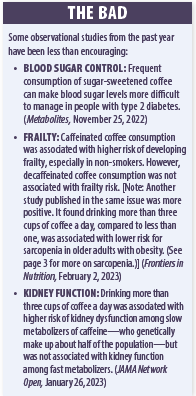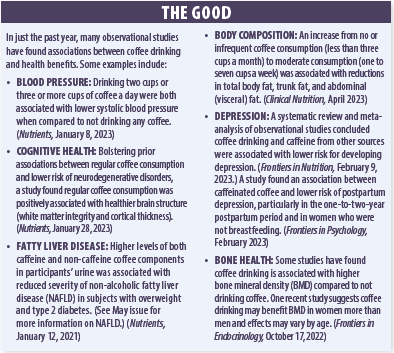According to the National Coffee Association, 62 percent of U.S. adults drink coffee every day. There is a lot of research on how coffee impacts our health. The majority of studies show health benefits (see The Good on page 8), but some show negative health impacts (see The Bad on page 8). What’s a coffee drinker to do?
Coffee and Health. “Coffee has been consumed for centuries,” says Alice H. Lichtenstein, DSc, the Gershoff professor of nutrition at the Friedman School. “It seems to be one of the items that people continually look for something bad about, but in most cases come up short.”
➧ Drink it…or Not. If you like coffee, keep drinking it. If you don’t, there’s no need to start. ➧ Hold the Sugar. Avoid presweetened “coffee drinks” full of added sugar and other additives like cream which deliver extra calories with little nutritional value. ➧ Stick to Early in the Day. If you are sensitive to caffeine, enjoy your brew before the afternoon to avoid interference with your sleep.
In 1991, the World Health Organization classified coffee as a possible carcinogen after observational studies showed coffee drinkers were more likely to be diagnosed with bladder and pancreatic cancers than non-drinkers. This designation was removed in 2016. It turned out people who drank the most coffee also smoked more, and it was the cigarettes, not the coffee, that were likely responsible for the observed association.
Regular coffee contains caffeine, but both regular and decaf also contain hundreds of other phytochemicals (compounds found in plants). “Coffee is an extract from beans—which are healthy and complex plants,” says Dariush Mozaffarian, MD, DrPH, dean for policy at the Friedmand School and editor-in-chief of this newsletter. “Scientists have spent a lot of time looking at the caffeine, but it’s likely other bioactive phytonutrients are most relevant.” While researchers are still uncertain of the exact actions of most of these compounds, many of them are known to be biologically active, meaning they interact with our body and its processes at a cellular level.
Decades of studies have compared participants’ self-reported coffee intake to indicators of their health. While observational studies like these cannot prove cause and effect, higher coffee drinking has been associated with lower risk for type 2 diabetes, dementia, Parkinson’s disease, cardiovascular disease, gallstones, several cancers (including colorectal, breast, and endometrial), and death from any cause. It’s important to note, however, that not all studies agree, and some have found associations with negative health effects.
 There are many reasons for this lack of clarity. Most studies rely on participants to report their own intake, which may not always be accurate. Also, the exact compounds and the levels of these compounds vary by variety of coffee bean and how it is prepared. The health impact of any brew can also be altered by the addition of sugar and cream—and there has been a rise in intake of hypersweet specialty coffee drinks. Women and men may react differently to coffee, and a person’s genetic makeup might determine the impact of particular compounds in the body. “Dose also matters,” says Mozaffarian. “In many studies, health benefits are not seen until higher intakes, like 3-5 cups per day.” Finally, associated lifestyle choices (like smoking) may also cloud the picture in observational studies. “Interestingly, nearly all studies find few differences between regular vs. decaf,” Mozaffarian says, “suggesting it’s the coffee, not the caffeine.”
There are many reasons for this lack of clarity. Most studies rely on participants to report their own intake, which may not always be accurate. Also, the exact compounds and the levels of these compounds vary by variety of coffee bean and how it is prepared. The health impact of any brew can also be altered by the addition of sugar and cream—and there has been a rise in intake of hypersweet specialty coffee drinks. Women and men may react differently to coffee, and a person’s genetic makeup might determine the impact of particular compounds in the body. “Dose also matters,” says Mozaffarian. “In many studies, health benefits are not seen until higher intakes, like 3-5 cups per day.” Finally, associated lifestyle choices (like smoking) may also cloud the picture in observational studies. “Interestingly, nearly all studies find few differences between regular vs. decaf,” Mozaffarian says, “suggesting it’s the coffee, not the caffeine.”

What to Do. Most, but not all, research suggests health benefits associated with drinking coffee. It should be noted that a diet rich in minimally processed foods also supplies your body with many phytonutrients—and the health promoting antioxidative and anti-inflammatory effects attributed them. “Unless told otherwise by your doctor, feel free to enjoy your coffee,” says Lichtenstein. “Just because you enjoy it, doesn’t mean it’s bad for you.”
























